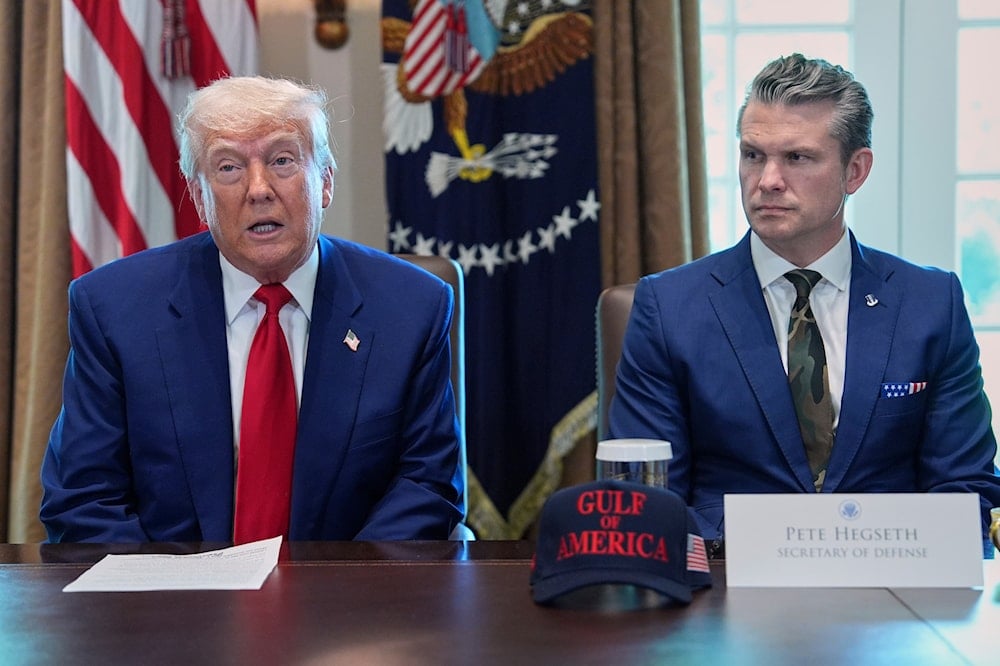White House to decide Pentagon Chief of Staff, bypassing Hegseth
The White House has rejected Pete Hegseth’s selection of Marine Col Ricky Buria as Pentagon chief of staff, citing leadership concerns and internal controversies.
-

US President Donald Trump speaks during a cabinet meeting at the White House, on Wednesday, April 30, 2025, in Washington, as Secretary of Defense Pete Hegseth looks on. (AP)
Frustrated by the continued dysfunction within Pete Hegseth’s Pentagon office, the White House has decided to reject his choice for chief of staff and will instead install its own candidate, according to two sources familiar with the matter.
Hegseth had proposed Marine Col Ricky Buria for the role following the departure of Joe Kasper, the office’s first chief of staff, who exited last month after a leak investigation that led to the removal of three senior aides.
The White House informed Hegseth that Buria would not be approved for the position due to concerns about his inexperience and repeated involvement in internal conflicts.
According to sources cited by The Guardian, Buria had served as a junior military assistant and is viewed as lacking the political judgment necessary for such a critical role, with one source directly involved stating that “Ricky will not be getting the chief position” and that he is seen negatively by nearly everyone at the White House who has interacted with him.
Shielding Hegseth from controversy
Although the presidential personnel office typically oversees political appointments across agencies, this decision to override Hegseth at a time of increased scrutiny exposes the Trump administration’s effort to prevent further instability by shielding the defense secretary from additional controversies.
There is growing concern within Trump's circle that Hegseth may not be able to survive politically if he is unable to manage the Pentagon without generating new internal crises.
Despite the rejection, a compromise was reached, allowing Buria to remain in a senior advisory role while the White House installs its own choice for chief of staff.
Neither the Pentagon nor the White House offered comments to The Guardian regarding the details of this arrangement, but officials familiar with the matter confirmed the decision was final and necessary due to the central role of Hegseth’s front office in sensitive policy discussions.
Hegseth's office currently operates with just five senior advisors, a significant reduction that has hampered operations and led to ineffective oversight, according to one official with direct knowledge.
The lack of formal management has allowed Buria to act as de facto chief of staff despite lacking formal approval and being previously rejected for the political appointee position by the presidential personnel office.
Ricky Buria’s Controversial Role and Background
Although Buria was never officially appointed, he had already relocated to the chief of staff’s office and began making physical changes, including redecorating with new furniture, further solidifying his unofficial position in the eyes of many within the Defense Department, according to The Guardian.
Career civilian staff in the deputy defense secretary’s office reportedly saw Buria as the acting chief and began treating him accordingly, even as formal approval was withheld.
Buria, a former MV-22 pilot who served in Iraq and Afghanistan, began his Pentagon career as a junior military assistant to Defense Secretary Lloyd Austin and retained his role under Hegseth, with whom he developed a close relationship. The two frequently traveled together and were often seen at the secretary’s Fort McNair residence.
Buria’s influence grew after Hegseth dismissed Air Force Lt. Gen. Jennifer Short, allowing him to assume responsibilities usually held by a senior three-star officer, including participating in bilateral meetings and attending foreign policy briefings as reported by The National Pulse.
When Army Lt. Gen. Christopher LaNeve was appointed as the new senior military assistant, expectations were that Buria would return to his junior role. Instead, Buria announced plans to retire from military service and sought to remain in Hegseth’s office as a political appointee, filling the gap left by Kasper’s departure, a move that raised additional concerns within both the White House and Pentagon, The Guardian revealed.
Leak Investigation and Buria’s Security Clearance Issues
As the internal leak investigation escalated, Buria’s name surfaced again when officials revealed he had undergone a polygraph test that yielded inconclusive results.
Under standard procedure, such outcomes would require a retest before access to sensitive materials could be granted, casting doubt on his continued involvement in classified decision-making.
The situation intensified further when officials identified Buria as the source of several messages in a Signal group chat that discussed imminent US missile strikes against Ansar Allah in Yemen.
According to The Wall Street Journal, Buria also had access to Hegseth’s personal phone, which added another layer of concern for those investigating breaches of operational security and communications protocol.
Despite the swirling controversy and multiple red flags, Buria remained close to Hegseth and attempted to transition into a political appointment, banking on their personal relationship and the disarray following Kasper’s exit.

 5 Min Read
5 Min Read








